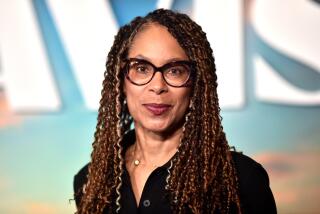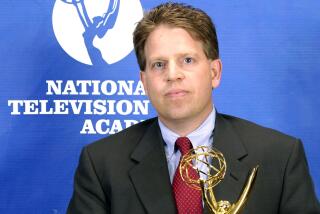PBS President Unexpectedly Steps Down
- Share via
PBS President and CEO Ervin S. Duggan resigned Wednesday, with the formal announcement Thursday catching most of the public television world by surprise. Duggan, who declined interviews, issued a statement saying that it was “time to move on to new challenges,” though he did not indicate what those might be. He will officially relinquish his duties Oct. 31, 5 1/2 years after joining the public broadcasting entity. His current contract was due to run through next June, but Duggan and PBS reached a settlement, according to PBS officials. The terms of that settlement were not disclosed.
“This is a voluntary decision on [Duggan’s] part,” said Colin G. Campbell, PBS board chairman. “It’s a conversation that’s been going on for a bit of time. I know he’s been thinking about other opportunities and had done what he thought he could do at PBS for several months.”
In the interim, PBS board member John F. Swope, former president of the Chubb Life Insurance Co., will serve as chief executive until a successor to Duggan can be found. PBS moved quickly to form a nine-member search committee, which also includes Sharon Rockefeller, president and CEO of WETA in Washington. A new appointment is not expected until next year, according to a PBS spokesman.
“My principal objectives have been achieved,” said Duggan’s statement. “A strategy to create greater financial security and enduring value for PBS and its member stations is now in place.”
Duggan, 60, is only the fourth executive to run PBS in its 30-year history. His wide-ranging career has included politics, where he was a speech writer during the Johnson administration. Duggan became a member of the Federal Communications Commission in 1990, appointed by then-President Bush, and remained there until he was tapped to head the 349-station PBS network in 1994.
Campbell, PBS board chairman and president of Rockefeller Brothers Fund, expressed gratitude for Duggan’s “impressive achievements,” including increasing PBS revenues to a projected $309 million in fiscal 2000 from $182 million in 1995. Currently 15% of PBS’ revenue comes from federal funding.
Duggan is credited with leading the fight against former House Speaker Newt Gingrich’s 1995 campaign to privatize PBS and halt its federal funding. Bill Moyers--a prolific contributor to PBS and longtime friend of Duggan--said of that era: “[Duggan] superbly articulated, ‘We’re like the public libraries, the public schools.’ He really rallied the public and this fragmented community to meet this challenge.”
Moyers, one of the few in whom Duggan confided, suggested that Duggan may simply have needed to be “rejuvenated, re-created.” Several months ago, he noted, at an event in Austin, Texas, Duggan “pulled me aside and said, ‘I’ve been doing this five years. I may be reaching the time when I need something else, and the system needs someone else.’ ”
Bill Baker, president and CEO of WNET in New York, said Duggan’s move is “a surprise but totally understandable. Five years of that job is as much as any individual might want to do.”
Rockefeller issued a statement calling Duggan “an articulate champion for public television.” She said she would work to find a new chief executive with “the vision and skills to work with stations to compete in today’s dynamic telecommunications environment.”
KCET President and CEO Al Jerome noted that “in an era of media consolidation, [Duggan] worked tirelessly on PBS’ ultimate goal--to provide culture, citizenship and information, always with an educational focus.”
More to Read
The biggest entertainment stories
Get our big stories about Hollywood, film, television, music, arts, culture and more right in your inbox as soon as they publish.
You may occasionally receive promotional content from the Los Angeles Times.










